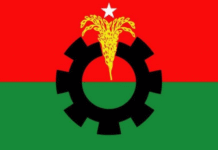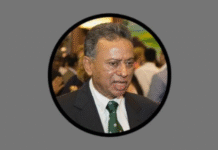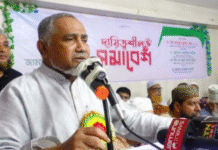
How well do you follow the headlines of your newspapers? If one were to run a quiz to see how well the readers of The Daily Star stack up against each other, the question that is most likely to be at the top of the list would be about the name that appeared most in the headlines of our central pages over the last week. The answer may surprise you: Abdul Quader Mirza, a local Awami League leader and incumbent mayor of Basurhat municipality in Companiganj, Noakhali. He grabbed headlines for seven consecutive days starting from January 7 in the front or back pages of The Daily Star, exceeding the number of appearances by his party chief, who usually has this place of honour when it comes to headlines or placement of new items in national newspapers.
I drop this little statistical truth bomb merely to illustrate the curious case of Quader Mirza, who has sparked a political firestorm with his shatya bachan (or truth telling) in the run-up to the second phase of municipality elections due on January 16. A two-time mayor of Basurhat, Quader Mirza is now up for re-election. But since declaring his manifesto on December 31, he has been seemingly on a warpath against his own party. In comments made in public meetings and to journalists, he let off a dizzying drumbeat of criticism, grievances and warnings, directed not just at the who’s who in greater Noakhali politics but also the central leadership.
What makes his case so curious is that he is also the younger brother of Awami League General Secretary Obaidul Quader, an obvious source of discomfort for the party rank and file. Although he claims that he merely meant to talk about corruption and irregularities in regional politics—not about national political issues—the remarks speak for themselves. Before we go into the broader implications of this issue, here’s a motley assortment of Mirza’s most contentious comments.
“There are some sycophants involved with greater Noakhali politics who claim the BNP’s fort in Noakhali and Laxmipur has been demolished under the leadership of certain leaders,” Quader Mirza is heard saying in a video clip of his December 31 speech that later went viral. “If there is a fair election, our MPs, except for the ones in three or four constituencies in greater Noakhali, will not even find a door to escape. That’s the truth.” On another occasion, he said, “Bangabandhu liberated the country to establish people’s right to food and vote. The right to food has been established, but we have not yet been able to establish the right to vote.” He, therefore, wants to ensure a fair election on January 16. He also claims there is a conspiracy afoot to rig the election against him and even to kill him, a claim he repeated several times over the week, saying he had received death threats for his bold assertions. Some local Awami League leaders also brought in illegal firearms to thwart his re-election bid, he alleged.
Without citing any name, he also talked about what leaders are like these days. “Leaders are those who burn people in broad daylight. Leaders are those who loot crores of taka through tender manipulation. Leaders are those who take Tk 5 lakh in exchange for jobs of police and primary teachers. Leaders are those who take Tk 3 lakh from a poor peon in exchange for his job,” he said. In his lengthy diatribes, Mirza spared no one—local Awami League leaders, MPs, administrative higher-ups including deputy commissioner (DC) and superintendent of police (SP), and even national leaders and former ministers. He spoke passionately about the crisis in leadership, sometimes with facts to back him. Thus he painted a landscape that is utterly chaotic, where morality is a moving target.
As extraordinary as these accusations and insinuations are, his observations about his own elder brother came as icing on the cake. Initially, he appeared appreciative of his brother’s achievements. But later he was coy on the subject, and on January 10, following a thinly-veiled threat from the former, he became quite vocal. He alleged that Obaidul Quader had acted as a major barrier to his emergence as a national leader. “In my student life, I wanted to study in Dhaka. But he advised me to study in Chattogram because he feared that I would emerge as a bigger leader than him. Obaidul Quader did not let us move ahead,” he said.
He added: “Before the national elections, Obaidul Quader promised to arrange jobs for eligible people in every household. But where are the jobs?” he asked. He expressed further resentment at a rally on January 12, saying, “In the presence of one of his domestic helps, he said I am a self-proclaimed mayoral candidate, and that I am not a party man. Now you people tell me whether I am a self-proclaimed candidate… This is an insult.” Whether there is any truth to his statement about his brother is immaterial to our discussion, but it does have the unexpected outcome of hitherto-suppressed sibling rivalry playing out on the big screen.
There is a lot to take away from Quader Mirza’s bold, relentless shatya bachan mission, which he launched apparently after having survived a tumour surgery. Such allegations about electoral fraud, voter suppression and widespread crimes and corruption with the connivance of ruling party leaders and loyalists usually come from opposition parties, and are roundly rejected by those in power. But coming from an “inside” man, not least one with decades of experience in grassroots politics, these acquire a veneer of credibility difficult to dismiss offhand. Allegations become revelations then, offering a window into the true state of politics in Bangladesh. While Quader Mirza appears paranoid at times and may have his own motive for turning on opponents so near to the election (after all, he equivocated on his own role in the picture he paints), he is certainly not the first politician to publicly challenge party interests/narratives. Nor is the reaction he received from party colleagues totally unexpected.
One may recall the fate of former Awami League minister and two-time MP Abdul Latif Siddiqui, who in September 2014 was widely criticised for his remarks about Muslim pilgrimage and certain Islamic organisations. Afraid to be judged unfavourably by its devout Muslim base, the party sacked him from his ministerial post. Further back in time, one may also recall the dramatic removal of then-President Badruddoza Chowdhury in June 2002 following an uproar over his refusal to pay a visit to BNP founder Ziaur Rahman’s grave on his death anniversary. In the not-so-short history of our democracy, we have seen many such instances of once-loyal party leaders and loyalists, decorated freedom fighters and even justices seeing the short end of the stick for their apparent revolts against authority or party narratives.
Will Quader Mirza meet the same fate? We don’t know. One thing is certain that there is still no tolerance for diversity of opinion within our so-called democratic parties, which view any reformist pushback as insubordination and therefore deserving of punishment.
To be frank, I’m not interested in the allegations Quader Mirza brought specifically against certain leaders. It’s his word against theirs. But many of his comments do confirm what we already know about political crimes and corruption in Bangladesh. Awami League leaders often talk about the infiltration of outsiders leading to divisions and opportunism within the party, giving it a bad rap in the process. But seldom do they talk about how these developments may be the outcome of its own lack of discipline and intraparty democracy as well as its ideological flexibility. A recent Prothom Alo report, citing data from the police headquarters about complaints filed with police stations across the country, shows an uptick in six crimes since the start of the pandemic. These are: rape, mugging, extortion, causing panic/terror, property grabbing, and cattle theft. If past trends hold, it can be assumed that criminals enjoying the protection of local ruling party leaders have been involved in many of these cases. Quader Mirza has added only three more to the list: election violence, tender manipulation and recruitment scandals. What’s surprising about it is that he chose to speak up.
Many have praised his courage. Many, especially party stalwarts, lambasted him for being hypocritical (“biting the hand that feeds him”). But for a party ruling the country as long as it has, Awami League will surely benefit from taking a page out of the book of the Communist Party of China which every now and then rejuvenates itself by exorcising corrupt party leaders and officials. Cleaning up malfeasance within party ranks, instead of punishing those who blow the whistle or demand reforms, is not just the right thing to do. It will also boost its image in the long run.
Badiuzzaman Bay is a member of the editorial team at The Daily Star. Email: badiuzzaman.bd@gmail.com









